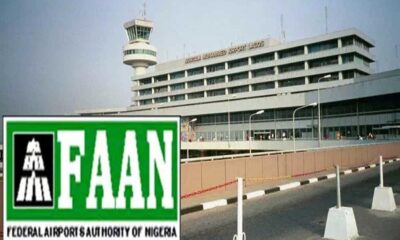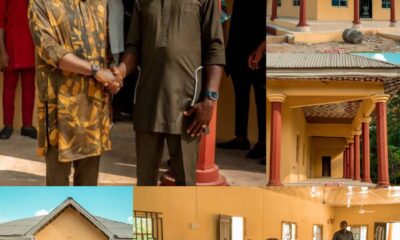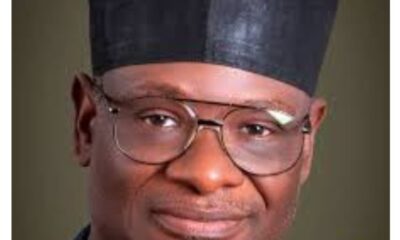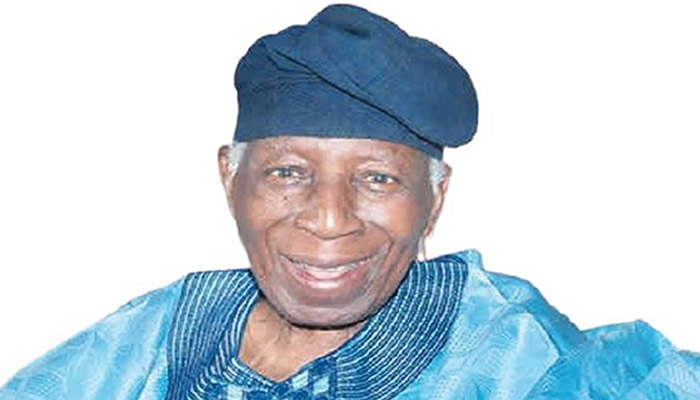EVENTS
Pakistan bans Pashtun group as government cracks down on dissent
Published
6 months agoon
By
Ekwutos BlogPakistani authorities have unleashed a draconian crackdown on dissent, breaking up opposition protests with violence and mass arrests and banning a movement to promote the rights of the ethnic Pashtun community under terrorism laws.
Hundreds of riot police fired teargas and charged with batons as supporters of Pakistan Tehreek-e-Insaf (PTI), the party of the incarcerated former prime minister Imran Khan, gathered to protest over the weekend in the cities of Islamabad and Lahore.
Dozens of PTI figures, including prominent leaders and lawyers, were arrested and hundreds more were charged under terrorism laws, with Khan among those named.
Khan’s supporters took to the streets to demand the release of their leader and to call for an independent judiciary. Khan, 71, has been held in jail since August 2023 on upwards of 100 charges of corruption and terrorism that he alleges are politically motivated. Khan was earlier sentenced to 10 years for leaking state secrets but the courts overturned the verdict.
Related: North-west Pakistan in grip of deadly Taliban resurgence
The weekend’s events marked a notable escalation of a crackdown on PTI that started several months ago. The crackdown began before February’s election, which was marred by allegations against the military establishment that it had rigged results to prevent the PTI from taking power.
Among the senior PTI figures picked up by authorities on the weekend was Ali Amin Gandapur, the chief minister of Khyber Pakhtunkhwa province. His party alleged he was “disappeared” from Islamabad for more than 24 hours before reappearing on Sunday night in parliament, where he claimed he had been held by police and paramilitary forces.
On Sunday night, the interior ministry suddenly announced that the government would be banning the Pashtun Tahafuz Movement (PTM), a peaceful organisation that has long championed the rights of Pakistan’s ethnic Pashtuns.
PTM has been highly critical of Pakistan’s powerful military establishment and its role in abuses and enforced disappearances in the Pashtun-dominated areas of Khyber Pakhtunkhwa and Balochistan.
In a brief statement, the ministry said that PTM had been declared a terrorist organisation due to “certain activities that are prejudicial to the peace and security of the country”. Pakistan’s human rights commission condemned the ban, emphasising that PTM was a peaceful organisation and describing the government’s decision as “neither transparent nor warranted”.
PTM has recently begun to mobilise in large numbers and had planned a historic three-day national gathering this week in Khyber Pakhtunkhwa.
The national gathering was planned as a response to the worsening security situation and increase in militant attacks in the region, as well as to challenge abuses committed by the military against Pashtuns. In an unusual move, PTI and other opposition parties had agreed to join the event in a show of unity.
Hundreds of PTM members have been arrested in recent days, and the organisation’s founder and leader, Manzoor Pashteen, is now in hiding. Fida Wazir, a PTM leader, said the group still intended to go ahead with the event, despite police and paramilitary forces attempting to break it up with violence and by setting fire to their camps.
“We will challenge the illegal ban in the court tomorrow,” said Wazir. “We are hopeful that the court will overturn the unjust and unconstitutional ban.”
The government is taking an increasingly iron-fisted approach to all forms of opposition even as it is weakened by growing economic and security problems.
It is ruled by an unwieldy coalition of the Pakistan Muslim League Nawaz (PML-N) and its former rival the Pakistan People’s party (PPP), and is seen as weak and beholden to the powerful military, which has long been accused of interfering in political affairs. The prime minister, Shehbaz Sharif, is increasingly unpopular with the public as the country grapples with sky-high inflation and an economic crisis.
Militant attacks have continued to rise in Pakistan’s border areas in the aftermath of the Taliban takeover of neighbouring Afghanistan, with little sign of the security situation improving. Almost 1,000 people have been killed in militant attacks and counter-terrorism operations in the past three months alone, the majority in Khyber Pakhtunkhwa and neighbouring Balochistan.
Senior figures in PML-N have repeatedly sought to blame Khan and PTI for the country’s woes. In July, the government said they would be banning Khan’s party but have yet to act on the threat.
This week, Maryam Nawaz, the PML-N chief minister of Punjab and the niece of the prime minister, said PTI was a “terrorist group that repeatedly is attacking its own country”, adding: “The state should treat the PTI like terrorists – otherwise, it will be too late.”
You may like


We are in control of NNPP – Kwankwaso’s loyalists snub court ruling


FAAN ends physical luggage checks at Lagos Airport


IMO DEPUTY SPEAKER, IWUANYANWU DONATES 500 CAPACITY TOWN HALL BUILDING TO NWANGELE COMMUNITY, SALUTES GOV. UZODIMMA FOR ENABLING PROJECTS EXECUTION


Someone gave me 300k to keep for him since August last year, Atanda, Yesterday i received a message from him on WhatsApp that i should pls send 70k to a particular acc0unt he provided and i did just as he instructed and shared him the receipt.


Ayuba Umar slams Nasarawa govt over 3-day Abuja retreat


Wike, others planning extend Rivers six months emergency rule – Suspended Commissioner, Gbali
EVENTS
Eke Hit Tells Court: “I’m a Content Creator, Not a Traditional Healer”
Published
8 hours agoon
April 7, 2025By
Ekwutos Blog
Eke Hit, a popular content creator, recently appeared in court and stated that his online posts are merely comedic skits intended for entertainment purposes.
He clarified that his content does not involve actual shrines or sacrifices, but rather is created to garner views and likes.
Eke content creator emphasized that his online presence is for entertainment purposes only.
Eke Hit’s court appearance has garnered significant attention, with many awaiting the outcome of the case.

By highlighting the comedic nature of their content, Eke Hit and other creators aim to distinguish their work from any potentially misleading or harmful activities.
EVENTS
Tinubu, Obasanjo, Makinde mourn as ex-Oyo gov Olunloyo dies at 89
Published
10 hours agoon
April 7, 2025By
Ekwutos Blog
The death of the former Governor of Oyo State, Dr Victor Omololu Olunloyo, has sparked an outpouring of grief from eminent Nigerians, including President Bola Tinubu, former President Olusegun Obasanjo, Oyo State Governor, Seyi Makinde, and many others.
Olunloyo, a renowned mathematician and technocrat, passed away on Sunday at the age of 89, just days before his 90th birthday on April 14, 2025.
He passed on around 1.40 am on Sunday, with his remains deposited at a private mortuary in Ibadan.
The deceased became a commissioner in the old Western Region at age 27, before he served as the Governor of Oyo State from October 1, 1983, to December 31, 1983, before the military regime of Gen Muhammadu Buhari seized power and truncated the democracy of the Second Republic.
His legacy as a brilliant scholar and dedicated public servant left an indelible mark on the educational and political landscape of Nigeria.
In his tribute, Tinubu extended condolences, praising Olunloyo for his pioneering work in mathematics and education, as well as his commitment to national development.
The President’s condolence message was contained in a statement by his spokesman, Mr Bayo Onanuga.
“Olunloyo, renowned for his mathematical prowess, obtained a PhD in Applied Mathematics and Number Theory from St. Andrews University in Scotland at 25 years.
“In 1962, at just 27, he became a commissioner in the old Western Region. He served multiple times as commissioner in the Western State, which succeeded the Western Region.
“Dr Olunloyo will be celebrated in academic circles for his brilliance and foundational contributions to applied mathematics and number theory.
“As an educator, he profoundly influenced future leaders and fortified educational institutions,” Tinubu said.
Reflecting on Olunloyo’s tenure as governor of the old Oyo State, Tinubu remarked: “Although his time in office was brief, his tenure was marked by exceptional vision and leadership.
“The abrupt end to his administration due to military intervention did not deter him from continuing to serve the nation.”
Obasanjo described Olunloyo as a patriotic Nigerian who stood for justice, peace and progress of the country till his last days on earth.
He said Olunloyo remained one of the notable Nigerians with deep blood of patriotism running in their veins.
In a statement by this Special Assistant on Media, Kehinde Akinyemi, on Sunday, the former President said “It was shocking and worrisome because we had lost Chief Ayo Adebanjo, Chief Edwin Clark, and now Dr Olunloyo just in weeks.
“Indeed, the ranks of the nation’s leadership are fast depleting by the loss of our dedicated and resourceful patriots who served the nation in various capacities, particularly at this crucial state in our nation’s history when their wise counsel and rich experience are greatly needed.”
Obasanjo commiserated with Makinde, the government and the good people of Oyo State and consoled them with the facts that Dr Olunloyo lived a life worthy of communal emulation, touched the soul of his community and mourned by all.
Makinde, in his tribute, expressed pride in having honoured Olunloyo during his lifetime, by naming significant landmarks after him.
He described Olunloyo as one of the state’s most cerebral leaders, whose contributions to education and governance would continue to inspire future generations.
Makinde, in a statement by his Chief Press Secretary, Sulaimon Olanrewaju, described Olunloyo’s death as the exit of one of Oyo State’s and Nigeria’s most cerebral former administrators.
“My joy is that our government immortalised and honoured Pa Olunloyo in his lifetime and he was present to witness it, as we named the Ibadan Airport Road and the Leisure Park on the axis after him, in recognition of his service to the state,” the governor stated.
“In Olunloyo, we have lost another icon. This time, we lost a highly cerebral and patriotic leader, who served our great state at its early stages.
“This death hits differently because I was looking forward to Baba’s 90th birthday, which would have come up on April 14, 2025,” he added.
The Southern Governors Forum described Olunloyo’s death, a few days before his 90th birthday, as a great loss to Nigeria and intellectuals around the world.
The chairman of the forum and Ogun State Governor, Dapo Abiodun, in a statement on Sunday, expressed the forum’s condolences to Makinde, and the government and people of Oyo State.
The forum described Olunloyo as a titan who left legacies that every Nigerian should be proud of, adding that he was a highly accomplished scholar and a genius even among geniuses.
The governor added that Olunloyo’s achievements as a prodigious scholar with reputable papers, and as an octogenarian with a sharp memory and wit, not to mention a lifelong dedication to books and the quest for knowledge in various fields, were well known.
He said: “Alas, like many giants before him, Dr Omololu Olunloyo has gone to rest.
“Although a scientist, Baba loved reciting poetry, particularly those by William Shakespeare, and, remarkably, did not read with glasses even in his old age.”
The former governor of Oyo State and the Otun Olubadan of Ibadanland, Oba Rashidi Ladoja, described the passing of a renowned mathematician, engineer and technocrat as the exit of a titan.
The senator representing Oyo South Senatorial District, Sharafadeen Alli, expressed sorrow over the passing of Olunloyo.
A statement by his Special Adviser on Media, Akeem Abas, in Ibadan, described Olunloyo’s death as the end of a golden era of wisdom, scholarship, and statesmanship in Nigeria.
He described Olunloyo as a towering intellectual and one of the brightest minds to ever serve in public office in Nigeria.
“The death of Olunloyo is a monumental loss to the state and Nigeria at large. He was a symbol of brilliance, simplicity, and unwavering commitment to public service.
“His contributions to governance, academia, and the development of our dear state remain unmatched,” he said.
The Speaker of the Oyo State House of Assembly, Mr Adebo Ogundoyin, described the late Olunloyo as a man of extraordinary intellect and dedication.
The speaker, expressing deep sorrow in a statement on Sunday, said Olunloyo’s contributions to the development of Oyo State and Nigeria remained unparalleled.
Ogundoyin said it was unfortunate that the state had lost a walking encyclopaedia and a pillar of wisdom in Nigerian politics.
“
Olunloyo was not just a leader; he was a beacon of knowledge and a source of inspiration to many. I read a lot about Olunloyo and marvelled at his level of knowledge.
“His legacy as a mathematician, engineer, and technocrat will forever be etched in the annals of history,” the speaker remarked.
Ladoja, in a statement by his media aide, Adeola Oloko, in Ibadan, said the late Olunloyo was a man of many parts who left his footprints on the sands of time.
“
Olunloyo shone and sparkled like a star right from his Government College, Ibadan days all through his university days in Scotland, which culminated in his becoming one of the youngest PhD holders in his days.
“He gave a good account of himself as one of the most officed persons with a long public service record in Nigeria,” Ladoja said.
The former governor said the greatest legacy of Olunloyo’s long service record was his incorruptibility.
Ladoja recalled that Olunloyo visited him in his Bodija, Ibadan residence only two weeks ago, adding that “He was in the wheelchair. I was surprised to see him.
“We discussed for an hour before he left. Whenever my elder brother came around, you can be sure there would be no dull moment. But then, I did not have a premonition that his visit was his way of bidding us farewell.”
The Executive Chairman of the Federal Inland Revenue Service, Zacch Adedeji, described the death of Olunloyo as the dropping of one the finest stars from Nigeria’s sky.
Adedeji, in a statement by his Special Adviser (Media), Dare Adekanmbi, in Ibadan, said the deceased was a genius of a rare breed, adding that he marvelled at Olunloyo’s intellectual depth and native intelligence.
“Papa Olunloyo could rightly be described as Nigeria’s Albert Einstein. He graduated with first-class honours and proceeded to bag a PhD in Applied Mathematics at the age of 26 at the University of St Andrews, Scotland.
“Every moment I shared with Papa while he was with us was an opportunity to pick lifelong lessons. He was very deep and his intellect was not just in Mathematics, but also in Classical Music with a bias for W.A Mozart’s works as well as in Literature.
“He would recite paragraphs and even lengthier dialogues from Shakespeare’s works and show how the lessons therein can be applied to life and living,” he said.
Adedeji lamented that a library of encyclopaedic collections had been set ablaze with the departure of Olunloyo.
The pan-Yoruba socio-political organisation, Afenifere, commiserated with the people and governor of Oyo State over the death of Olunloyo.
In a statement by the National Leader of Afenifere, Pa Reuben Fasoranti, on Sunday, the group said the late Olunloyo left an indelible mark on Oyo State’s history through his tireless contributions to education, governance, and public service.
The statement read, “Afenifere is deeply saddened to hear of the passing of Dr Victor Omololu Olunloyo, the former governor of old Oyo State.
“As a brilliant scholar, mathematician, and engineer, Dr Olunloyo left an indelible mark on Oyo State’s history through his tireless contributions to education, governance, and public service.
“His vision for a better future, leadership, and commitment to the people of Oyo State will forever be remembered. We extend our heartfelt condolences to you, the people of Oyo State, and all who knew him.”
A
former Postmaster General of the Federation, Ismail Adewusi, on Sunday, described Olunloyo as a rare gift that Nigeria never appreciated.
In a statement in Ibadan, Adewusi described Olunloyo as an abundant gift to humanity, whose full opportunities Nigerians never tapped.
He said Olunloyo was a genius who, in other climes, could have been allowed a massive space to bring to bear on the country his rare mental capacity.
“The late Olunloyo was a global phenomenon in Applied Mathematics and Number Theory. At a time when such areas of studies remained in the realm of esoteric academic pursuits, Olunloyo had emerged as a master of the Numbers.
“But his depth of knowledge transcended the numbers game. He was deeply knowledgeable in history, literature, and to a very appreciable reach, law, and philosophy,” he said.
Speaking of Olunloyo’s aversion to mediocrity, Adewusi recalled that he was a man who championed the course of merit in all spheres of life.
Expressing sympathy with the immediate Olunloyo family, Adewusi also commiserated with the entire people of Ibadan and the state in general, noting that Olunloyo’s place in history was assured.
He urged the government to look for a more befitting way to immortalise the late academic and political icon.
EVENTS
Suspected kidnappers terrorizing Otukpo LGA apprehended
Published
20 hours agoon
April 6, 2025By
Ekwutos Blog
Three notorious kidnappers have been apprehended in Ogoli-Ugboju of Otukpo Local Government Area of Benue State.
In a post on his official Facebook page, the Chairman of Otukpo Local Government Area, Hon. Maxwell Ogiri, announced the arrest of the three members of the notorious five-man kidnapping gang that has been terrorizing Otukpo and nearby communities.
The suspects—identified as Ibrahim Salleh, Ashimu, and Abuh Umaru—were apprehended on Sunday, 6th April 2025, during a coordinated security operation in Ogoli-Ugboju.
Hon. Ogiri praised the efforts of the security operatives involved and assured the public that investigations are ongoing to apprehend the remaining gang members and their local collaborators.

We are in control of NNPP – Kwankwaso’s loyalists snub court ruling

FAAN ends physical luggage checks at Lagos Airport

IMO DEPUTY SPEAKER, IWUANYANWU DONATES 500 CAPACITY TOWN HALL BUILDING TO NWANGELE COMMUNITY, SALUTES GOV. UZODIMMA FOR ENABLING PROJECTS EXECUTION
Trending

 Trending6 months ago
Trending6 months agoNYA demands release of ‘abducted’ Imo chairman, preaches good governance
- Business6 months ago
US court acquits Air Peace boss, slams Mayfield $4000 fine

 Politics6 months ago
Politics6 months agoMexico’s new president causes concern just weeks before the US elections
- Entertainment6 months ago
Bobrisky transferred from Immigration to FCID, spends night behind bars
- Entertainment6 months ago
Bobrisky falls ill in police custody, rushed to hospital

 Politics6 months ago
Politics6 months agoRussia bans imports of agro-products from Kazakhstan after refusal to join BRICS

 Politics6 months ago
Politics6 months agoPutin invites 20 world leaders
- Politics1 year ago
Nigerian Senate passes Bill seeking the establishment of the South East Development Commission.

